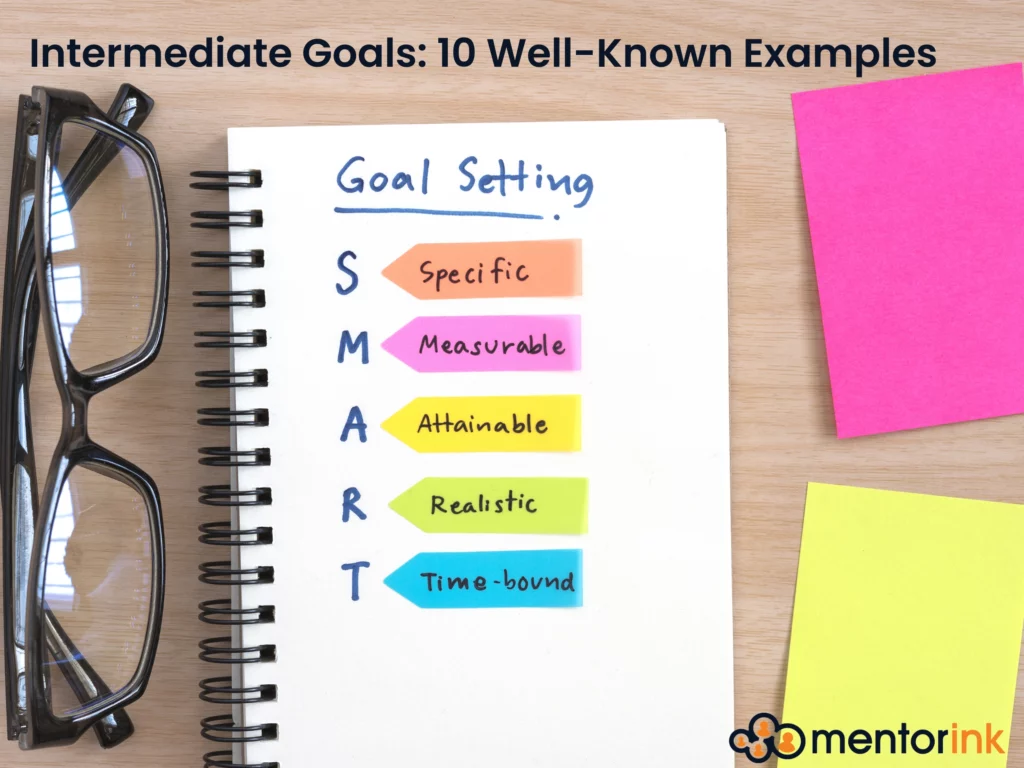
Setting short, long or intermediate goals seems a key part of being successful in both your private and professional lives. Short-term goals keep us on track, and long-term goals help us imagine what the future will be like. But intermediate goals are very important because they help us connect the two in a better way. You can get to where you want to be by reaching these goals.
What are Intermediate Goals?
An intermediate goal can be defined as an important position between short-term and long-term goals. It usually takes between a few months and a few years to reach these goals, which are meant to help you reach your bigger, more crucial goals. You can think of them as checkpoints that help you stay on track. Also you can see how far you’ve come toward your main goal.
If your long-term goal is to establish your own business, an intermediate goal could be to finish a business training or preserve a certain amount of money for the start-up costs. These steps are important because they show real success, which helps you stay motivated and on track as you work toward your bigger goals. What intermediate goals are for is that they help break down big long-term goals into smaller, more doable steps.
Why Setting Intermediate Goals is Crucial?
For many reasons, it’s essential to set middle goals. To begin, they help you feel like you can reach your long-term goals. You can avoid feeling overwhelmed and putting things off by breaking down a big, sometimes scary goal into smaller, easier-to-achieve steps. When you set intermediate goals, you can focus on taking one step at a time, building up to your bigger goal.
Second, these goals help you keep track of your growth. You can see how far you’ve come and what changes you need to make by setting secondary goals. This will help you stay on track and make smart choices that will help you reach your long-term goals quickly. Intermediate goals can be considered like a GPS system; they advise you what to do next and give you feedback.
Last but not least, secondary goals are somewhat inspiring. Every time you reach one, you feel good about yourself, which makes you want to keep going. Without these smaller steps, it can feel like you’ll never reach your long-term goal, which can make you want to give up. Minor achievements along the way help you keep going and boost your confidence.
Setting intermediate goals is a part of being successful professional life. But setting long-term goals is also another important part for getting better achievements. Our blog content about “11 Examples of Long-Term Career Goals” can be useful to understand types of goals.
10 Well-Known Intermediate Goals Examples
Intermediary goals regulate both private and professional life and enable individuals to be more successful. The most well-known examples of intermediary goals are as follows;
Getting a Certificate or Course
Getting a certification or finishing a course represents a great intermediate goal, whether it has to do with your job or a personal interest. It helps you learn the skills and information you need to reach your long-term goals, like moving up in your career or switching fields.
Saving a Specific Amount of Money
If you want to buy an investment property or start a business in the future, saving a certain amount of money over a certain amount of time is an ideal intermediary goal. It helps you keep track of your money and learn how to stick to a budget.
Expanding Your Network
Building a professional network is important for both business and personal growth because it opens the door to new possibilities. Setting a mid-term goal, like going to a certain number of industry events or meeting certain people through networking within a year, can help you get ready for long-term success.
Getting a Job Advancement
If your long-term goal is to be an employer or an executive, getting an advancement at work can be a useful step along the way. Getting this objective done helps you to have a better career and gain useful knowledge.
Learning a New Skill
A very useful intermediary goal is to learn a new skill, like how to code, speak in public, or learn a foreign language. For those looking to incorporate fitness into their routine while achieving personal wellness goals, trying WallPilates with effective workouts to help you stay fit and build strength, making it easier to achieve long-term health objectives can be a great step. This sets you in a better place for future opportunities in your personal or professional life and gives you an edge in your field or business.
Improve Your Credit Score
Having outstanding credit may affect many parts of your daily life.For example, your credit score can help financiers decide if you can get loans and credit cards, which can let you buy big things with low interest rates or not.
Building an Emergency Fund
For financial security, building an emergency fund is a crucial intermediate goal. Having a safety net of six months to a year’s worth of living expenses can help stabilize your finances. Also you can work toward larger goals like investing, buying property, or retiring early.
Improving a Specific Professional Skill
Intermediate goals often involve skill-building, and for professionals aiming to advance in their careers, improving a specific skill can be a valuable target. For instance, if you want to become a manager, setting a goal to enhance your leadership or project management skills through workshops or coaching sessions can help you get closer to that promotion.
Paying Off a Specific Debt
If you want to be financially free or retire early, you could aim to pay off a specific debt, like a credit card, personal loan, or car loan. Eliminating these types of debt provides financial relief, reduces your monthly obligations, and frees up income. It also puts you in a better position to reach larger financial goals, such as paying off a mortgage, investing, or building long-term wealth.
Redesigning Your Workspace
An often-overlooked but highly impactful intermediate goal could be redesigning your workspace. Whether it’s at home or in an office, creating an organized, aesthetically pleasing, and functional workspace can improve your productivity and mental well-being, helping you stay focused on your broader professional goals.


